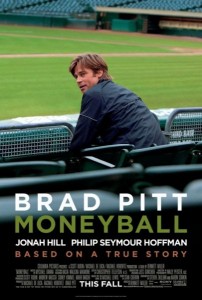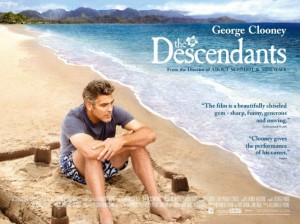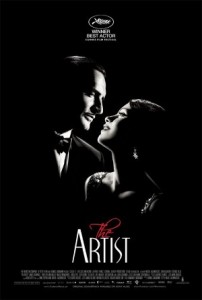Based on the new rules of The Academy, this year we have nine titles to choose from for Best Picture. Did you know that a total of 5% of all Academy voters have to vote for one film to win Best Picture for it to be nominated in that category?
I’ve seen seven of them, which is a decent amount, although I am sorry to miss both War Horse and Extremely Loud and Incredibly Close. As with all other years I’ve been watching The Oscars, I feel that some movies should have been nominated for this or that and for whatever reason they weren’t… well, that’s part of the fun of it, isn’t it? I’ll warn you that it’s much better if you’ve seen these films before reading on – as I was drafting this post, I realized I have a great many “spoilers” included below, so be forewarned! Let’s dive into these one by one – in no particular order:
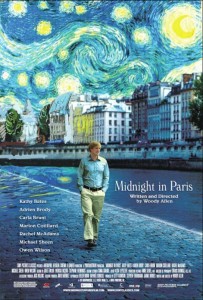 Midnight in Paris
Midnight in Paris
Dir: Woody Allen
Stars: Owen Wilson, Rachel McAdams, Michael Sheen
I want to be clear and forthcoming from the get-go that I have never been to Paris, France. Paris, Kentucky, yes, but not the City of Lights. There are phenomenal shots of the city as the trailer effectively showcases: at night, during the day, the evening, even in the rain. I am not arguing that the idea for the movie is a bad one, either: in fact, it’s phenomenal! Who wouldn’t want to meet their literary influences from another era? Making it personal for a moment, what wouldn’t I give to have a sit down dinner in the early 1960s with David Lean? So, it’s a great idea and a fine setting with excellent production quality – those are the film’s strengths.
My frustration with the film is the aggravation I experienced in its main character, a character I’ve seen in countless other Woody Allen films. Am I wrong in saying that the film would have been much more engaging with, I don’t know, let’s try Emile Hirsch as the star? And he’s a just-graduated Lit Major with a minor in French Culture or something and he’s saved up all his money to go to Paris right after graduation with his dubious girlfriend of three years who he knows he wants to marry, but she isn’t so sure… Wouldn’t that be more engaging to watch rather than have Owen Wilson’s character “gee” and “gosh” his way through the countless insults from Rachel McAdam’s parents in the movie? And perhaps it’s just me, but I don’t feel sorry for a fellow who has to move to Malibu, CA. I can’t shed one tear for that character, so I don’t care about his opinions in meeting all these incredible people! I felt like he didn’t deserve their company: my take is simply that Midnight is worth a watch, but not Best Picture caliber…
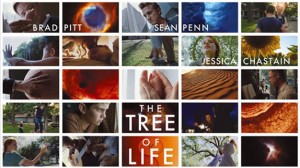
Tree of Life – already covered this one and I stand by what I said! Have a look here -http://ronhamprod.com/?p=485
Moneyball
Dir: Bennett Miller
Stars: Brad Pitt, Jonah Hill, Philip Seymour Hoffman and Stephen Bishop
I think this film totally deserves the nod for Best Picture. I was chatting with a pal of mine the other night, who didn’t like the film as much as I did, and he asked outright, “what was it ABOUT???” I’ll do my best to recap that discussion. To me, Moneyball is a cautionary tale. Brad Pitt’s character, Billy Beane, is so focused on winning the World Series – with OAKLAND, and no other team – that he can neither see nor enjoy the success that’s unfolding in front of him. Think about this: once a year, a Major League Baseball team wins the World Series… but it may never occur again in Beane’s lifetime that a team has a streak like that A’s team did in 2002. A team he assembled!
And yet, Beane can’t watch the games. He is incessantly tense around his older-than-her-age daughter (see note at the very bottom of this post). He can’t begin to rekindle things with his wife. As we check into his life, we see he’s willing to alienate all of his scouts, push his owner to the very limit both financially and from a respect standpoint – and why? Because he wants a Series that bad. What’s cool about the film is that a lot of Pitt’s best scenes as Beane come across very genuine because of the set up. When he destroys the team’s good time after a loss and asks them if losing feels that great, it doesn’t come across canned at all – we believe him. I completely agree with his nod for Best Actor, too: isn’t it a fact that this is Pitt’s own Jerry McGuire role? But the frustrating thing about Moneyball is that Pitt’s doing what perhaps many of us do – he takes for granted the little things and doesn’t exactly enjoy living this wonderful life he’s got.
Now let’s talk about Jonah Hill for a minute. Not sure if you’ve seen Superbad, but I promise a review on that instant classic one of these days. Regardless, if there’s one element to Hollywood’s personality that will never change, it’s that they love a reinvention. Hill is the latest example in a long line of reinvented actors. His performance in Moneyball was pitch perfect and further, the writers (Aaron Sorkin, Stan Chervin and Michael Lewis who wrote the book the film’s based upon) deserve some credit here for combining the antics and energy of Pitt’s Beane with the straight man of Hill’s character, Peter Brand.
The Descendants
Dir: Alexander Payne
Stars: George Clooney, Shailene Woodley and Beau Bridges
The latest Alexander Payne offering is a more sophisticated and emotional drama than any of his previous works: I’d describe the film as a serious drama, peppered with comedy and certainly not the other way around. Regardless, I think the story is an engaging, cautionary tale, much along the same lines of Moneyball and The Artist. Wouldn’t you agree that a common theme between these three titles is simply, “Be careful how you live your life?”
The film concerns Clooney’s character Matt King as he navigates treacherous waters with his daughters after his wife, whom he’s separated from, has a terrible sea accident. As if this family emergency isn’t enough, King also has to deal with his brothers and sisters and cousins as they decide whether or not to sell a substantial plot of land on the island. You’d be surprised how well these two storylines intersect.
And I’ll give The Descendants a big piece of credit for letting the setting embody the entire work. What I mean is, this film MUST be set in Hawaii: the story demands it, the music and sets accentuate it – even the poster plays on the idea of what Matt King says in voice over in the beginning of the film, that just because Hawaii is a destination, a vacation many of us can only dream of, it doesn’t mean that the folks who live there don’t struggle like the rest of us. My final thought on this film is how nice the final image of this film felt… I won’t ruin it in case you’re reading this without having seen it, but the last frame of The Descendants speaks to Payne’s ability to take you on a dramatic journey without going overboard with any one element, like the Sid character, for example…
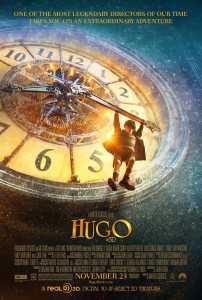 Hugo
Hugo
Dir: Martin Scorsese
Stars: Asa Butterfield, Chloe Grace Moretz, Sacha Baron Cohen and Ben Kingsley
There was no need for me to “drink the Kool-aid” on this one – I liked it immediately. Leave it to ol’ Scorsese to mix in a message about film preservation into an adapted children’s story! My point is that Hugo has something for everyone: 3D technology for the film geek in me, a kid’s story for the kid, film preservation for the guy thirsting for knowledge, and Sasha Baron Cohen’s station cop for comic relief – what’s not to like?
I had studied Melies’ films way back in Intro to Film, but those lessons didn’t take away from the storyline of Hugo at all. When you think of films that make you feel like a kid again, I think this one easily fits in the category. Hugo reminds you of a time in your life when being small had its advantages: within the film, the title character is able to maneuver amongst the catacombs of a Paris train station in the 1930s because of his size… So, while the storyline concerning the little boy was great in its own right, I really dug the scenes dedicated to the early days of films, and how pioneers like Melies – who came from different artistic backgrounds – created the techniques that we, as an audience, have come to expect today.
Hugo is incredibly imaginative thanks to its art direction, cinematography and costumes – not to mention prop department! Think of the automaton, such a key part of the story, and how the film kind of made you want to play around with it, right? How did the film makers create that feeling? I’m not adding anything new in saying that I thought the production’s use of 3D technology added a special layer to the film – IE, it helped to tell the story from a cinematic standpoint instead of feeling “tacked on” like many blockbusters of recent years. On the subject of the automaton, I think it’s kind of interesting how in our digital age of everything conveniently located on your mobile/smartphone, we’re suddenly fascinated by things that have moving parts – is analog coming back?
The Artist
Dir: Michael Hazanavicius
Stars: Jean Dujardin, Berenice Belo and James Cromwell
If you haven’t guessed by now, I’m a bit of a film geek. So, perhaps it’s natural that I didn’t like The Artist – I loved it. What a charming tribute to the birth of film, which was essentially music videos. When, in the early 1900s, you would buy your ticket to the theater, you’d have moving pictures displayed on a screen, and you’d have an organist or pianist playing music: that’s all your nickle would buy. The Artist does a splendid job of taking us back to those days – but in an entertaining way.
I don’t think the film will spawn a new day of silent features. I do think that it was a great idea that was executed extremely well. We have a hero we like in Jean Dujardin: I mean, look at that smile! The way he plays with his dog and rescues the girl and all that… What a fellow! Do we have a romantic interest? Yes! Berenice Bejo more than fits the role as Peppy Miller, one of thousands of actresses who gets her big break and falls in love with George Valentin, the Errol Flynn-esque star played by Dujardin. The love story that results is set in motion by the birth of sound in motion pictures during the late 1920s. Peppy is in exactly the right place at the best time to become a star, while guys like Valentin, well, the audience doesn’t want to hear him speak.
What surprised me about the film was how genuinely it delivered its message of the importance of loyalty and how pride can literally ruin a person. If dialogue had been added, I’m not sure the film would have achieved the same emotional level. Perhaps that’s why the industry has so unequivocally embraced the movie is that, in this day of incessantly adding new layers to Film in the form of visual effects, animation and 3D, The Artist strips it all away to its very base and reminds us that the medium is about telling a story through moving pictures. That’s it! Perhaps its message is a reminder to K.I.S.S.
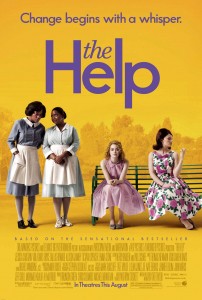 The Help
The Help
Dir: Tate Taylor
Stars: Emma Stone, Viola Davis, O, Jessica Chastain and Bryce Dallas Howard
I’m not sure what my problem is with dramas released in the month of August, but it seems to take me forever to see them. The Help is no exception and for whatever reason, I finally got to it last night – what a fine feature it is! It reminded me of Rudy and Moneyball in that its message is dependent on your perspective.
What I mean is, some people hate Rudy because “it’s a Notre Dame movie.” My response has always simply been, “No, it’s not.” I can see how some theater goers may have put up some walls about this title, as in, “Gee, that looks like a made-for-TV movie…” or, “Man, I’m just not in the mood for that kind of drama…” Concerning the subject matter, folks may say The Help is about race. Or, it’s about your parents wanting you to do anything but what you’ve chosen to do with your life. It’s about ignorance being passed down from one generation to another. The film could even be about the hateful ways that women interact with each other once they get pissed off… Isn’t it about all these things? And isn’t that depth what Academy voters salivate over when they select the nominees?
I was impressed with the acting and the way these characters were able to seamlessly move in and out of Jackson, Mississippi’s social tiers. This was no Lifetime movie: it moved and felt like a true cinematic drama. The costumes looked like the clothes that these characters would wear, and did not go “over the top.” The lighting and cinematography had its promotional photo moments, but it did an ample job of setting the scene: IE, I felt hot when the ladies were fanning themselves… Bottom line, I think this title did a tremendous job of telling a compelling story of race and “caste” life in the ’60s South, without making it trite or feel like a “movie of the week.”
One final note of disagreement with the Academy… and I say this with no disrespect… but I thought Bryce Dallas Howard got snubbed for her role as Hilly Holbrook. Again, I’m not taking anything away from Ms. Chastain nor Ms. Spencer – they both did a SWELL job! But I wanted to wring Holbrook’s neck, and I felt throughout the movie as if the actress was familiar, but I simply couldn’t place her…. That’s hard to sink into a role to that level. Anyhow, you’ve got to see this link – Rotten Tomatos seems to have thought that Ms. Howard is Ms. Chastain (see pic #7 of 33 in the link below)?
http://www.rottentomatoes.com/gallery/2012_oscar_noms/#10245388
And here are my thoughts on the Awards from last year…
http://ronhamprod.com/?p=365
Note: Does anyone else share my opinion that this trend of youths who are much, much older than their age in films is wearing thin? I don’t mind one or two lines of dialogue from kids orteens in Indy films that make you go, “huh, what a great line/perspective/thought!” But this idea that kids are SO ahead of their time is, to me, a little much.

